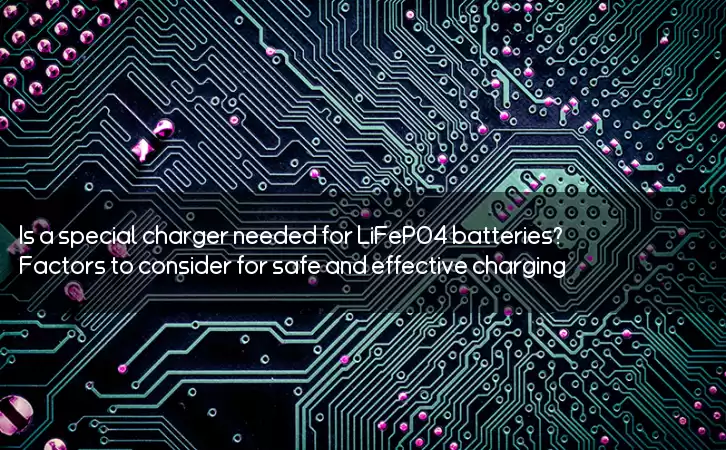Information Center
Is a special charger needed for LiFePO4 batteries? Factors to consider for safe and effective charging
Published:2023-06-07 10:36:25 Author:Green WCND Views:31LiFePO4 batteries, also known as lithium iron phosphate batteries, have become increasingly popular in recent years due to their many advantages over traditional lead-acid batteries. These advantages include higher energy density, longer cycle life, and faster charging times. However, many users are unsure whether LiFePO4 batteries require a special charger, given their unique chemistry and characteristics. In this article, we will explore whether LiFePO4 batteries need a special charger, and what factors you need to consider if you want to charge your LiFePO4 battery safely and effectively.

Firstly, it’s important to understand the basic principles of LiFePO4 batteries. These batteries have a nominal voltage of 3.2V per cell, which is higher than most other types of lithium-ion batteries. They are also less sensitive to heat and less prone to thermal runaway, making them safer and more stable than other lithium-ion batteries. However, LiFePO4 batteries have a lower energy density than some other lithium-ion batteries, which means they require a larger physical size to achieve the same capacity.

When it comes to charging LiFePO4 batteries, there is no simple answer to whether a special charger is needed. It depends on the specific battery and charger you are using. While some manufacturers recommend using a dedicated LiFePO4 charger, others claim that a regular lithium-ion battery charger will work just fine. The key is to find the right charger that is capable of delivering the correct voltage, current, and charging algorithms for your particular LiFePO4 battery.
One important consideration is the charging voltage. LiFePO4 batteries have a lower charging voltage than other lithium-ion batteries, typically around 3.6V per cell. This means that if you use a charger designed for higher voltage lithium-ion batteries, you may overcharge your LiFePO4 battery, which can cause damage or even safety issues. Therefore, it’s important to use a charger that is specifically designed for your LiFePO4 battery, or one that is adjustable and can be set to the correct voltage.
Another important factor is the charging current. LiFePO4 batteries have a relatively low internal resistance, which means they can handle high charging currents without overheating or degrading. However, if you use a charger that is too weak, it can take a long time to charge your LiFePO4 battery, and may even damage it over time. Therefore, it’s important to choose a charger that can deliver enough current to charge your battery efficiently, without causing any harm.
Finally, it’s worth considering the overall quality of the charger you are using. Cheap, low-quality chargers can be unreliable and may not provide the correct charging algorithms or safety features needed to keep your LiFePO4 battery safe and healthy. It’s worth investing in a high-quality charger from a reputable manufacturer, one that has been designed specifically for LiFePO4 batteries and has been tested and approved to meet any relevant safety standards.
In conclusion, whether or not you need a special charger for your LiFePO4 battery depends on the specific battery and charger you are using. While some LiFePO4 batteries can be charged with a regular lithium-ion battery charger, it’s important to ensure that the charger can deliver the correct voltage, current, and charging algorithms for your particular battery. Investing in a high-quality charger from a reputable manufacturer is also important to ensure the safety and longevity of your LiFePO4 battery. By following these guidelines, you can ensure that your LiFePO4 battery is charged safely and effectively, and can provide reliable power for all your needs.
The battery pack is the heart of a golf cart, silently powering every acceleration and climb on the green. However, battery degradation often goes unnoticed, mu···
The battery pack is the heart of a golf cart’s power system, yet maintaining it has long been a challenge for technicians. Traditional troubleshooting methods—···
For golf course managers, ensuring smooth and efficient operations is crucial for providing a memorable experience for golfers and maintaining the reputation of···
A battery tester ensures golf course cart batteries operate efficiently and reduces downtime through the following ways:I. Precise Battery Condition DiagnosisOp···





